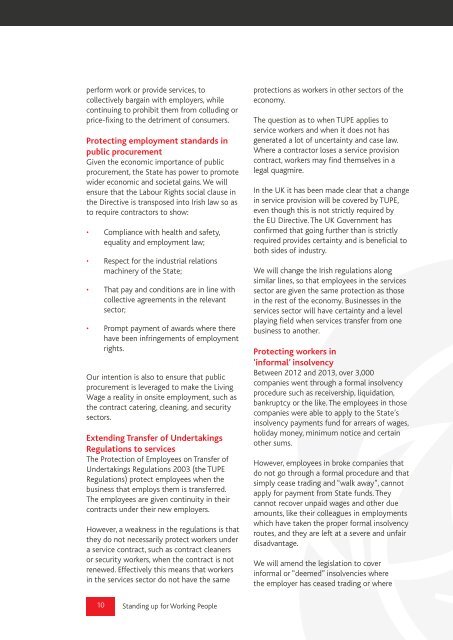for Working people
labour_workers_charter_2016
labour_workers_charter_2016
Create successful ePaper yourself
Turn your PDF publications into a flip-book with our unique Google optimized e-Paper software.
per<strong>for</strong>m work or provide services, to<br />
collectively bargain with employers, while<br />
continuing to prohibit them from colluding or<br />
price-fixing to the detriment of consumers.<br />
Protecting employment standards in<br />
public procurement<br />
Given the economic importance of public<br />
procurement, the State has power to promote<br />
wider economic and societal gains. We will<br />
ensure that the Labour Rights social clause in<br />
the Directive is transposed into Irish law so as<br />
to require contractors to show:<br />
• Compliance with health and safety,<br />
equality and employment law;<br />
• Respect <strong>for</strong> the industrial relations<br />
machinery of the State;<br />
• That pay and conditions are in line with<br />
collective agreements in the relevant<br />
sector;<br />
• Prompt payment of awards where there<br />
have been infringements of employment<br />
rights.<br />
Our intention is also to ensure that public<br />
procurement is leveraged to make the Living<br />
Wage a reality in onsite employment, such as<br />
the contract catering, cleaning, and security<br />
sectors.<br />
Extending Transfer of Undertakings<br />
Regulations to services<br />
The Protection of Employees on Transfer of<br />
Undertakings Regulations 2003 (the TUPE<br />
Regulations) protect employees when the<br />
business that employs them is transferred.<br />
The employees are given continuity in their<br />
contracts under their new employers.<br />
However, a weakness in the regulations is that<br />
they do not necessarily protect workers under<br />
a service contract, such as contract cleaners<br />
or security workers, when the contract is not<br />
renewed. Effectively this means that workers<br />
in the services sector do not have the same<br />
protections as workers in other sectors of the<br />
economy.<br />
The question as to when TUPE applies to<br />
service workers and when it does not has<br />
generated a lot of uncertainty and case law.<br />
Where a contractor loses a service provision<br />
contract, workers may find themselves in a<br />
legal quagmire.<br />
In the UK it has been made clear that a change<br />
in service provision will be covered by TUPE,<br />
even though this is not strictly required by<br />
the EU Directive. The UK Government has<br />
confirmed that going further than is strictly<br />
required provides certainty and is beneficial to<br />
both sides of industry.<br />
We will change the Irish regulations along<br />
similar lines, so that employees in the services<br />
sector are given the same protection as those<br />
in the rest of the economy. Businesses in the<br />
services sector will have certainty and a level<br />
playing field when services transfer from one<br />
business to another.<br />
Protecting workers in<br />
‘in<strong>for</strong>mal’ insolvency<br />
Between 2012 and 2013, over 3,000<br />
companies went through a <strong>for</strong>mal insolvency<br />
procedure such as receivership, liquidation,<br />
bankruptcy or the like. The employees in those<br />
companies were able to apply to the State’s<br />
insolvency payments fund <strong>for</strong> arrears of wages,<br />
holiday money, minimum notice and certain<br />
other sums.<br />
However, employees in broke companies that<br />
do not go through a <strong>for</strong>mal procedure and that<br />
simply cease trading and “walk away”, cannot<br />
apply <strong>for</strong> payment from State funds. They<br />
cannot recover unpaid wages and other due<br />
amounts, like their colleagues in employments<br />
which have taken the proper <strong>for</strong>mal insolvency<br />
routes, and they are left at a severe and unfair<br />
disadvantage.<br />
We will amend the legislation to cover<br />
in<strong>for</strong>mal or “deemed” insolvencies where<br />
the employer has ceased trading or where<br />
10<br />
Standing up <strong>for</strong> <strong>Working</strong> People







